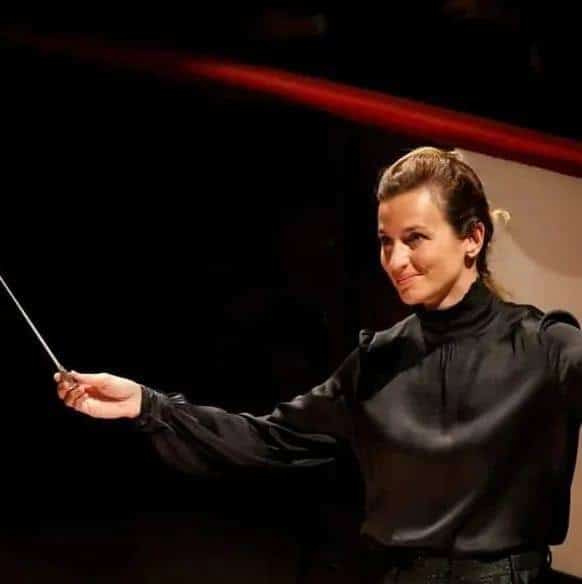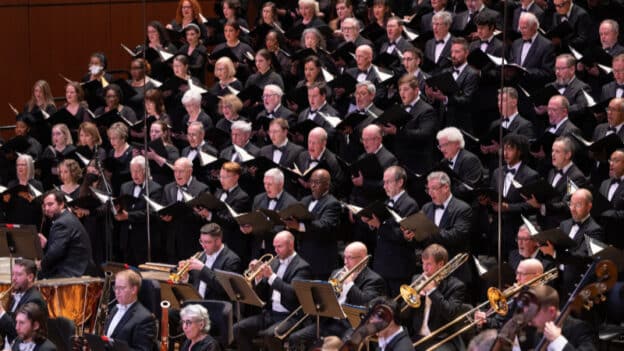Breaking news: Universal cleans out classical stable
mainNo connection to the Paris trial of its former bosses, Universal Music Group has finally moved today to get rid of its weapons of mass classical destruction.
Universal Classics and Jazz, a hybrid construction, is to be shaken down from the top. Its president, Chris Roberts, is expected to leave today ‘to pursue other interests’ (the official line goes) and the dumbing-down policies of the last 15 years are to be reversed.
They didn’t exactly cheer at Deutsche Grammophon HQ when the news of Roberts’ departure was announced at lunchtime, but the wave of satisfaction could be felt three countries away.
Roberts, imposing his lowbrow tastes on a high-class business, demolished Decca and meddled constantly in DG, appointing sucessive label chiefs and obsessively spying on them (as I recounted in The Life and Death of Classical Music). His crossover disasters cost the label a fortune and much of its hard-won credibility.
Market share soared as a result of his dumbing down but core customers deserted and the labels lost their allure. Lang Lang quit in disgust and other prestigious names are said to be on the brink of rupture.
Once Roberts departs – I write these words with trepidation since he’s a corporate animal who has repeatedly dodged the chop – reconstruction can begin. New appointments will follow in the next few days.
For Deutsche Grammophon, this is a Berlin Wall moment – a historic chance to reinvent itself as an entity of acknowledged integrity. It’s drinks all round at the yellow label tonight.





With the consolidation that has taken place over the last years, the fragmentation of the classical industry, and seemingly the only markets worth pursuing being in the Far East, the former major labels have a huge job to recoup their lost home-market credibility. I wonder if the trend towards one-stop-shopping with agencies and concert promoters being under the same roof as the label will really help them regain their lost ground. I certainly don’t see the labels returning to the days when they decided who became conductor of any given ensemble. One of Chris Roberts’ henchmen explained to me in 1998 that in the bad old-pre-Universal-takeover of PolyGram days, the major record companies were like water-tanks being fed by a thousand tiny trickles. In the brave new world of inter-galactic labels like Universal Music, the thousand trickles were going to be consolidated into a gushing stream such as Bocelli sales were representing at the time. Quality-inflation followed and to discerning musicians and listeners, the last 10 years have brought about a situation where a contract with a major label seems tantamount to artistic mediocrity combined with a pretty face. Cross-over followed cross-over; Karaoke-crooners of popular opera arias followed one another in rapid succession and the few serious artists remaining found themselves unable to document their developments as musicians while having to sell themselves to the lowest common denominator. If they were lucky enough to have a full recording of one of their trademark performances consigned to disc, it was only the result of a live transmission and came courtesy of one of Europe’s many local broadcasters. The renewal of the industry can really only come with a slow but serious expansion of new repertoire and artists’ combinations. This requires more than even the biggest labels can deliver. It requires the support of musicians, promoters, press and broadcasters to invest in long-term initiatives. There are any number of highly charismatic talents now on offer who must be wondering what to do once they enter middle-age. A pretty face and winning personality is by no means a de-facto negation of being a serious and thoughtful musician who has something important to say. But until the people come along who can align the talents with fresh and novel repertoire initiatives, the public will simply lose interest. The labels will become a service offering recordings as concert (er, sorry, ‘event’) souvenirs. I have said it before and say it again: Classical music performances gain enormously through investment in studio recordings. “Live” offers a totally different experience. It’s nonsense to state that performers take risks ‘live’ that they don’t take in the studio. This is Orwellian doublespeak put out by the major labels and their lap-dogs in the press to justify their reasons for not investing in far better but more expensive studio-recordings with their star artists. In fact the very opposite is the case. Musicians take risks in the studio they wouldn’t dream of taking on stage and the result is something very different often offering the very best a musician is capable of producing. It’s often an idea or effect pulled-off in the stillness of the studio that would not be possible in a concert hall. It isn’t “dishonest”, it’s still the work of a gifted and talented musician or singer. It took Chris Roberts and his colleagues only a decade to destroy the credibility of half a century’s work and investment. It will take another major upheaval to regain it. I believe it will have to be an upheaval in content and no more gimmicks, talent-show winners and spin. I only hope that some mega-mogul in one of the inter-galactic super-labels doesn’t simply decide the easiest solution is a format change in order to force the public into dumping their CDs and buying something new. Personally, I don’t see this as being a credible means of digging the former blue-ribbon labels out of the hole dug by Chris Roberts and his henchmen.
All well and good, but one wonders about the relevancy of CD labels going forward – the past, ultimately, cannot control the future.
Given the accuracy of the prediction that the Decca label was to be “wiped off the map” by Valentine’s Day … of 2009, may I respectfully request an additional source to corroborate this (admittedly very welcome) news?
NL replies: Matthew, I was right about Decca. It was shut down as a production centre and slated for total abolition. It was the protests aroused by my report that saved it temporarily from execution. That threat has now been removed with the departure of Chris Roberts.
Lang Lang quit in disgust? I’d love to see a source for that.
Do you know the numbers for classical music cds? What is it… 1,000 copies can get you to the top of the billboard charts for a week. That’s nothing. What was there to save, or to ruin?
There’s plenty of boutique labels out there. They are what classical music needs right now. Canteloupe, Tzadik, home labels, and the occasional “big” label releases support the demand for classical music now.
There’s also a trend with Orchestras releasing their own material, which I fully support.
Not to mention that cds are almost dead anyway.
But please, let me see the source for the Lang Lang comment.
well, don’t be so certain that the people that replaced him are all that concerned with the great reputation of DG, or the classical history of the company. You probably know more of what’s going on than I, but I can’t say there’s one ounce of trust I have for the higher ups. You’ve said it before, the glory days were prompted by owners who cared for the content above all. UMG cares for the return, and probably, to possibly be sold somewhere along the way. The only reason he is being let go is probably that Mr. Roberts’ focus on turning his entire division into a more pop music focused division has finally been noticed and been seen as redundant inside the world’s largest music company. That might bode well for the future of DG – it might not. The general mentality at these major companies is becoming “shrink everything down”. Fewer retailers, fewer releases, fewer employees. Very little need for new recordings, and just throw the catalog out there as inexpensively as possible and let it churn. We shall see what happens.
Recording live is a very worthwhile strategy for musicians and for music-lovers, so long as (i) the performances are well rehearsed and indeed ‘special’; even more vitally that (ii) they really are ‘live’ so the word means something beyond a marketing-speak badge. In my experience the worst hazard is the intervention of over-production from the control-room. Too often you end up with the worst of all worlds – an over-edited second or third rate studio recording made against the clock in adverse circumstances, also in the process undermining the live concert for which the audience paid good money for tickets.
The concert gets undermined (i) because the dress rehearsals get lost in the process and become pre-emptive recording sessions (ii) because musicians perform more cautiously in concert since they do not want to stay behind for patching sessions and (iii) because the auditorium and stage get littered with a whole load too many distracting microphones and clutter.
A good few CDs which are emblazoned as ‘live’ are transparently nothing of the sort – and most often because of the ambitions of the control-room team to be in charge, to manipulate and to sanitise, much more than to satisfy the musical objectives of the performers. People go to the circus to see a performer wobble on the high-wire, nearly fall off the trapeze, for a clown to fall over and for there to be an atmosphere of ‘scratch&sniff’ circus. A classical concert may well smell better, but the electricity and atmosphere are every bit as much a part of the occasion and their removal is counter-productive.
One major ‘live’ label for whom I used to work put two ‘live’ releases out last year with less content from the concert than from patching sessions. One example in their catalogue has less than 2mins of ‘live’ on the CD, another has more than 1000 edits cutting in and out of rehearsal, concert and patching takes. Both CDs are insufferably boring and I shall certainly never listen to either ever again. On another recent ‘live’ production the same label kept the performers behind after the concert till 3am rerecording the concert material with no audience present. These circumstances do not bring out the greatest in musicianship and are very unpopular as well as ultimately dishonest.
I am sorry, but if the public stops buying new classical recordings because they are uninspiring, boring, dishonest, unsatisfying and no good we have no-one to blame but ourselves. The longer term success or failure of our industry depends not on corporate board-room politics, nor on control-room smoke&mirrors over-editing and trickery, but on whether we put material out which the public thinks is worth buying and good value for money. It is unreasonable to expect to be able to steer the market any other way. If you own a restaurant chain which is overpriced and sells meals people do not want to eat, then it is folly to blame the public for eating elsewhere or staying at home. Changing the maitre d’, pretending it is 1990 again with the 3 Tenors, or redesigning the menu’s front cover will not be enough on their own.
I would say this news can be quite heartening to long-suffering consumers who have grudgingly put up with the crossover releases passed off as Decca and DG product. However, could there be a risk that this could mean the beginning of the end of the Universal classical labels? Is there a risk that Chris Roberts’ replacement could continue the dumbing down policies we’ve seen? And would Costa Pilavachi be able to pull Universal out of the hole? I sense it would be easier said than done because it might take time to get back some of the artists who were fired in the past decade…